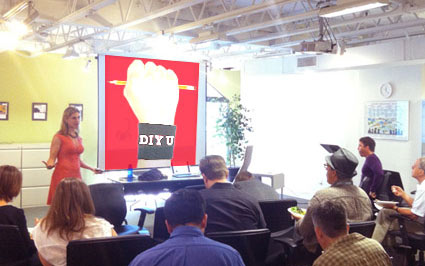Future Now
The IFTF Blog
Anya Kamenetz Tells What's in Store for Education
Author Anya Kamenetz came in recently and presented some hard truths on education. First of all it is wildly expensive. Second, it is not accessible to everyone, and third, its relevance (in traditional form) is shifting. While these truths may be hard to stomach—from heavy individual tuition bills to institutional path dependency—they are by no means hard and fast.
We can see how enraged society is getting about the cost of education from loud examples around us, such as a protest in Montreal that used the outline of a hand ‘flipping the bird’ as its route through the city’s grid, or the cries shouted by Occupy Wall Street earlier this year. Quieter statistics tell us that 67% of undergraduate students emerge with loans averaging $27,803. People are rightfully wondering how our systems can change.
Access is partly wrapped into the cost conundrum. But it also highlights a different component of education—its constant demand. As Kamenetz says, “in a knowledge economy, there’s just a need for more and more education.” Tuition is growing faster than any other good or service in the US economy. Those who obtain a Bachelors degree are likely to seek a Masters and so on, meaning approximately 25% of US citizens have a post-secondary education already.
The question of relevance that Kamenetz raises completes the triumvirate of problems within our current education ecosystem. Is what we are teaching and learning any good? Kamenetz asks more precisely, “Is the stuff that we’re learning and the ways that we’re learning it really relevant to the world we live in?”
Kamenetz has written about education and new forms of learning facing the Y generation for several years, both at Fast Company and through her own books. Her most recent project, DIY U, has gotten her excited about the ways people are changing the education landscape. From technology-adaptive endeavors such as the Khan Academy and P2PU (a peer to peer “university” setting), to free online courses offered by Ivy League educators, there are new ways of learning that focus on changing the content, social element and accreditation of knowledge.
Are we all going to attend online courses such as Stanford University’s “Algorithms: Design and Analysis, part I” and then socialize on these issues and questions via Facebook? How do we “prove” our knowledge if not through a degree? IFTF’s Executive Director, Marina Gorbis, suggested at a March conference with Kamenetz on Hacking Higher Education that, “young people today are caught in the transition between two worlds—the world of institutional production of education and a new world of possibilities for highly personalized on-demand continuous learning.” Kamenetz highlights this middle ground as a new kind of currency, suggesting value in the knowledge that lies somewhere in the middle—“between a university summa cum laude degree and the book I just read.”
She suggests that traditional universities should re-appropriate their existing infrastructures toward technology-forward, more open resources for students. This could also include a focus on helping students navigate their learning style and productivity, something already begun at Empire State College. Smoother transitions between experiences gained outside the classroom—whether making workplace connections or weaving in past learning, say from the military—and receiving course credit are other reform options.
While the traditional university education will not disappear, the greater sphere of learning is moving towards cheaper, more accessible, and relevant modalities. IFTF is launching a project on the Future of Learning: Reimagining the Higher Education Landscape in 2013 that uses its forecasting methodology to reimagine higher education futures, including some of Kamenetz’s work. Without a doubt, there is plenty of room for diversity in the realm of education. As Kamenetz asks, “How boring and hard does education have to be? Can it be fun and hard?” Add to that, and free? And relevant?




